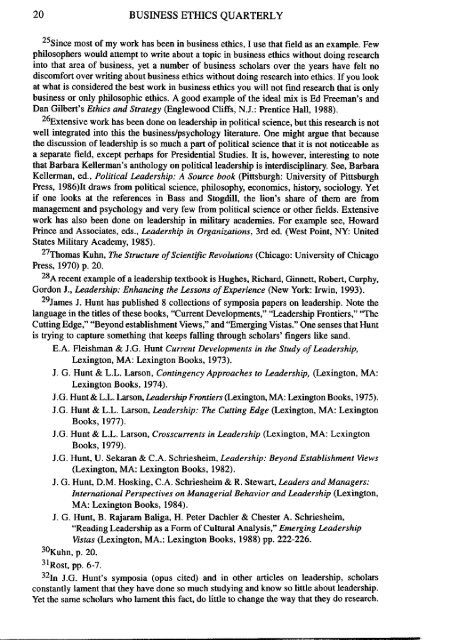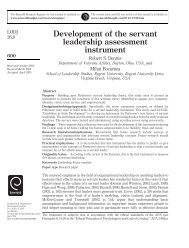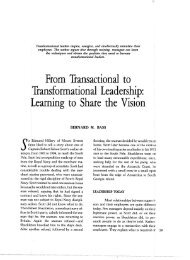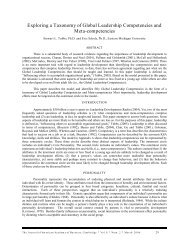LEADERSHIP ETHICS: MAPPING THE TERRITORY - Strand Theory
LEADERSHIP ETHICS: MAPPING THE TERRITORY - Strand Theory
LEADERSHIP ETHICS: MAPPING THE TERRITORY - Strand Theory
Create successful ePaper yourself
Turn your PDF publications into a flip-book with our unique Google optimized e-Paper software.
20 BUSINESS <strong>ETHICS</strong> QUARTERLY<br />
OK<br />
Since most of my work has been in business ethics, I use that field as an example. Few<br />
philosophers would attempt to write about a topic in business ethics without doing research<br />
into that area of business, yet a number of business scholars over the years have felt no<br />
discomfort over writing about business ethics without doing research into ethics. If you look<br />
at what is considered the best work in business ethics you will not find research that is only<br />
business or only philosophic ethics. A good example of the ideal mix is Ed Freeman's and<br />
Dan Gilbert's Ethics and Strategy (Englewood Cliffs, N.J.: Prentice Hall, 1988),<br />
''"Extensive work has been done on leadership in political science, but this research is not<br />
well integrated into this the business/psychology literature. One might argue that because<br />
the discussion of leadership is so much a part of political science that it is not noticeable as<br />
a separate field, except perhaps for Presidential Studies. It is, however, interesting to note<br />
that Barbara Kellerman's anthology on political leadership is interdisciplinary. See, Barbara<br />
Kellerman, ed,. Political Leadership: A Source book (Pittsburgh: University of Pittsburgh<br />
Press, 1986)It draws from political science, philosophy, economics, history, sociology. Yet<br />
if one looks at the references in Bass and Stogdill, the lion's share of them are from<br />
management and psychology and very few from political science or other fields. Extensive<br />
work has also been done on leadership in military academies. For example see, Howard<br />
Prince and Associates, eds.. Leadership in Organizations, 3rd ed. (West Point, NY: United<br />
States Military Academy, 1985),<br />
Thomas Kuhn, The Structure of Scientific Revolutions (Chicago: University of Chicago<br />
Press, 1970) p. 20.<br />
^^A recent example of a leadership textbook is Hughes, Richard, Ginnett, Robert, Curphy,<br />
Gordon J., Leadership: Enhancing the Lessons of Experience (New York: Irwin, 1993).<br />
^^James J. Hunt has published 8 collections of symposia papers on leadership. Note the<br />
language in the titles of these books, "Current Developments," "Leadership Frontiers," "The<br />
Cutting Edge," "Beyond establishment Views," and "Emerging Vistas." One senses that Hunt<br />
is trying to capture something that keeps falling through scholars' fingers like sand,<br />
E.A. Fleishman & J.G. Hunt Current Developments in the Study of Leadership,<br />
Lexington, MA: Lexington Books, 1973).<br />
J, G. Hunt & L.L. Larson, Contingency Approaches to Leadership, (Lexington, MA:<br />
Lexington Books, 1974).<br />
J.G. Hunt & L.L. Larson, Leadership Frontiers (Lexington, MA: Lexington Books, 1975),<br />
J.G. Hunt & L.L, Larson, Leadership: The Cutting Edge (Lexington, MA: Lexington<br />
Books, 1977).<br />
J,G, Hunt & L.L, Larson, Crosscurrents in Leadership (Lexington, MA: Lexington<br />
Books, 1979).<br />
J.G, Hunt, U. Sekaran & CA. Schriesheim, Leadership: Beyond Establishment Views<br />
(Lexington, MA: Lexington Books, 1982).<br />
J. G. Hunt, D.M. Hosking, C.A, Schriesheim & R, Stewart, Leaders and Managers:<br />
International Perspectives on Managerial Behavior and Leadership (Lexington,<br />
MA: Lexington Books, 1984).<br />
J. G. Hunt, B. Rajaram Baliga, H. Peter Dachler & Chester A. Schriesheim,<br />
"Reading Leadership as a Form of Cultural Analysis," Emerging Leadership<br />
\^stas (Lexington, MA.: Lexington Books, 1988) pp. 222-226.<br />
30Kuhn, p. 20.<br />
3'Rost, pp. 6-7,<br />
^•^In J.G. Hunt's symposia (opus cited) and in other articles on leadership, scholars<br />
constantly lament that they have done so much studying and know so little about leadership.<br />
Yet the same scholars who lament this fact, do little to change the way that they do research.







